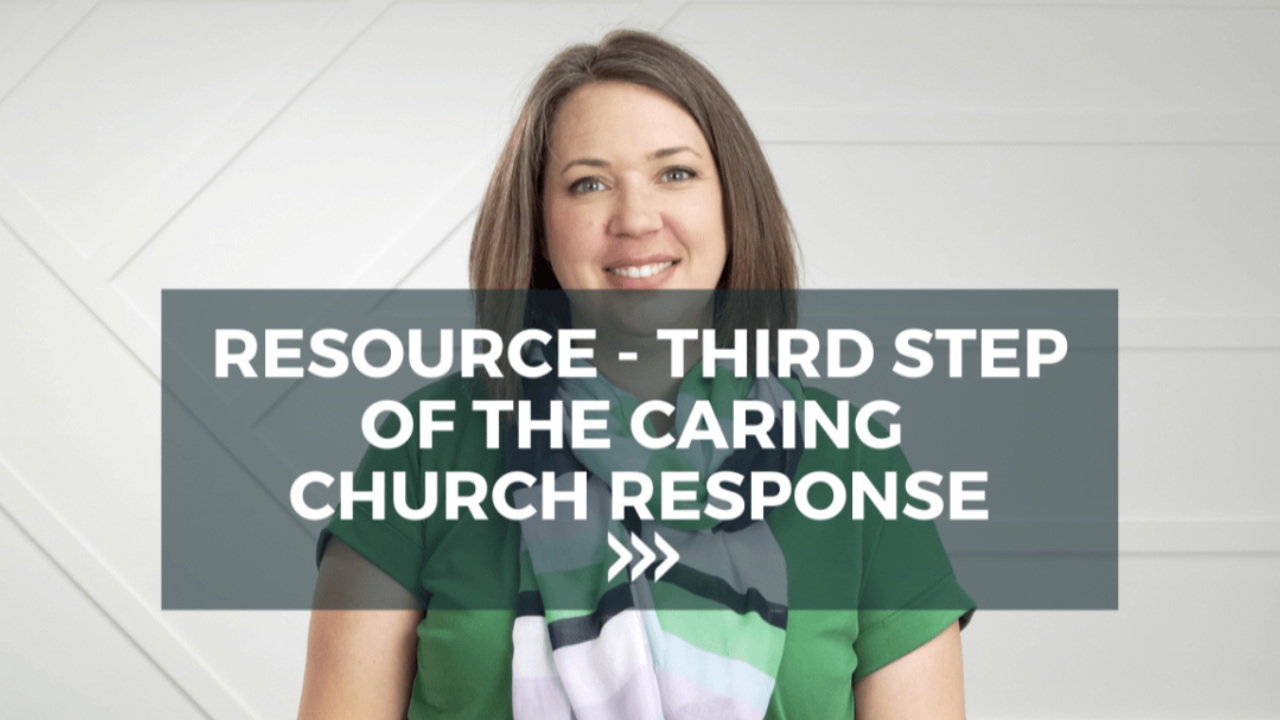RESOURCE – THIRD STEP OF THE CARING CHURCH RESPONSE
May 23, 2023
15 years ago, when I first started my career as a social worker, I was bright-eyed and bushy-tailed, ready to make a difference. I wanted to impact my community for change and help people overcome struggles and find freedom. But I was unprepared for the intensity of suffering, trauma, and layered cultural and systemic challenges that impact people on a personal level. These were things that I had no ability to change.
Like many of you, I was thrust into the world of supporting others with very few practical skills or lived experience of the daily challenges people faced.
THE 3RD STEP OF THE CARING CHURCH RESPONSE, RESOURCING IS ALL ABOUT EQUIPPING YOUR TEAM WITH THE SKILLS TO CARE FOR OTHERS AND LEVERAGING YOUR COMMUNITY RESOURCES TO CARE FOR PEOPLE EFFECTIVELY.
I am very fortunate to have started my career as a social worker in an organization that valued training and education. I took advantage of that and enrolled in every opportunity. Soon, I no longer felt overwhelmed and underqualified to support people through highly complex issues. I was confident in my skills and was able to navigate our community resources much easier. As a result, those who I was supporting found freedom faster.
As ministry leaders, you tend to be isolated and working with limited resources. There is often just enough to cover direct ministry let alone skills training and education. Now, years later, the issues your congregants and community are facing are increasing in complexity and you’re unsure of how to best support your people.
In previous blogs we discussed the Caring Church Response. The process begins with Recognizing the strengths, gaps and needs within your staff, congregants and community.
This is followed by Restore: tending to the weariness that comes from serving and supporting others. Essentially refilling your cup so that you are ministering from the overflow.
The third step is Resourcing. Now that strengths, gaps and needs have been identified and you are rested and restored, it’s time to equip you and your team with the resources you need to care for your church and community. These resources might come through skills training, burnout prevention, or collaboration.
There are two modes of training available, online and in-person, each with their own pros and cons. Online training or courses are useful as they allow your team to work at their own pace. They are easily accessible and are often more affordable.
Training done by local organizations offers unique benefits as they often highlight services and resources that are local and unique to the local needs. In-person training often has the biggest impact and best fulfills team-building needs.
Regardless of where the training comes from it’s essential that those on your care team are properly equipped. They need to be provided with the skills and knowledge to support others as well as the tools and strategies to maintain their own well-being and avoid compassion fatigue and burnout.
With the help of Hope Made Strong, seeking training resources and building community partnerships can be made much easier. Having access to a wide network of mental health training and resources means you can be matched up with ones that will elevate your teams’ skills and capacity to support and strengthen your community and team. You can check out some of these resources at hopemadestrong.org/courses, or use the contact me page and reach out via email.
Within the resource step, a key component is to collaborate with community resources.
In the resource guide 3 Steps in Building a Care Ministry, I walk you through how to leverage your community resources and begin to collaborate and expand your influence. By doing this you can dramatically increase your capacity to serve your people and relieve the pressure from your care ministry.
If you don’t know how to start building or strengthening your care ministry, I recommend starting by leveraging your community resources and building collaborative partnerships. In doing this, your people will feel more cared for, your church will gain community influence, and stigma for seeking support will be reduced.
The Resource phase of the Caring Church Response is often overlooked. After the team’s cups are filled they are eager to engage in ministry. However, by strengthening your teams’ skills, knowledge, and capacity you are building a foundation that will allow for sustainable ministry. Care team members will be both confident and competent to do the work of the ministry.
Budgeting for training, education and prevention is not overtly fun (unless you are someone like me) but the church will flourish when your teams are equipped with the tools to care for people well. Staff will remain resilient and have longevity in ministry. So I encourage you to seek out training and take advantage of community resources so that you and your team can become more confident and effective in caring for your church.

